北师大版必修四Unit 12 Culture Shock reading 课件 (共55张PPT)
文档属性
| 名称 | 北师大版必修四Unit 12 Culture Shock reading 课件 (共55张PPT) | 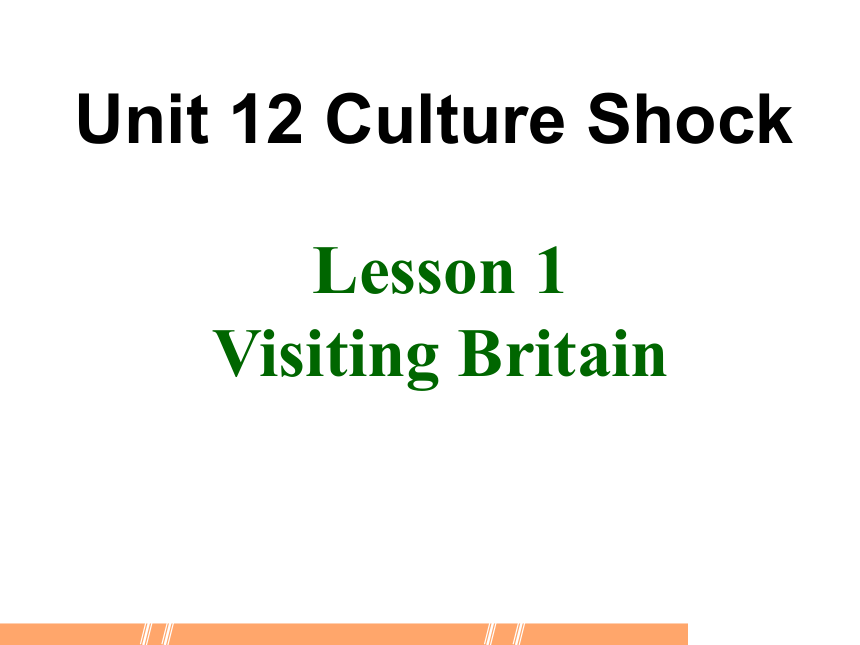 | |
| 格式 | zip | ||
| 文件大小 | 9.6MB | ||
| 资源类型 | 教案 | ||
| 版本资源 | 北师大版 | ||
| 科目 | 英语 | ||
| 更新时间 | 2018-11-22 08:25:46 | ||
图片预览

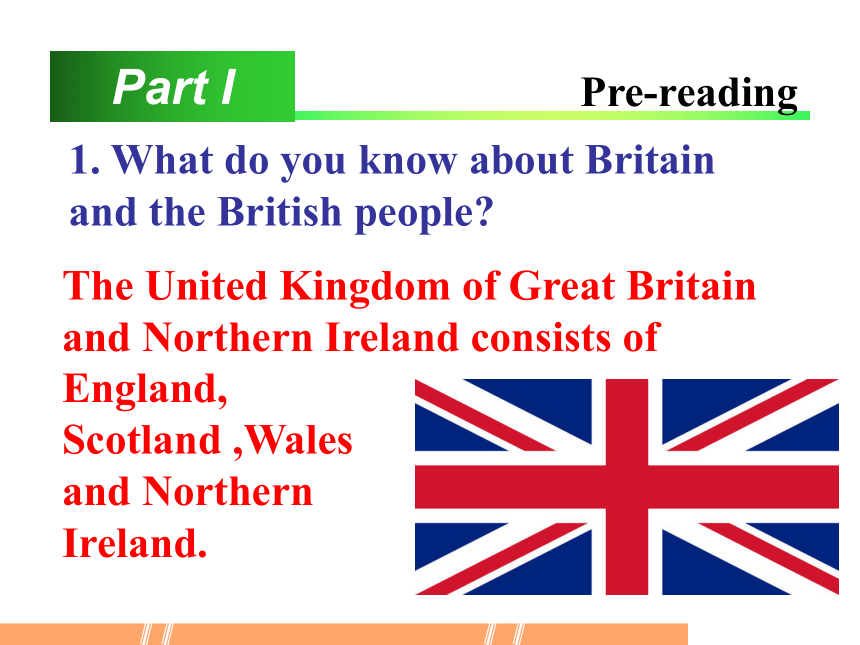
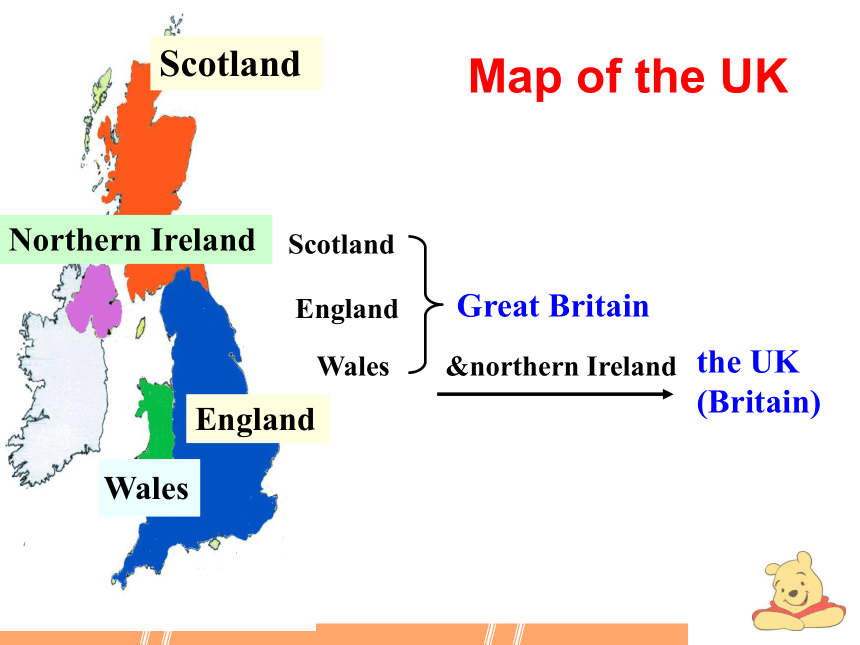
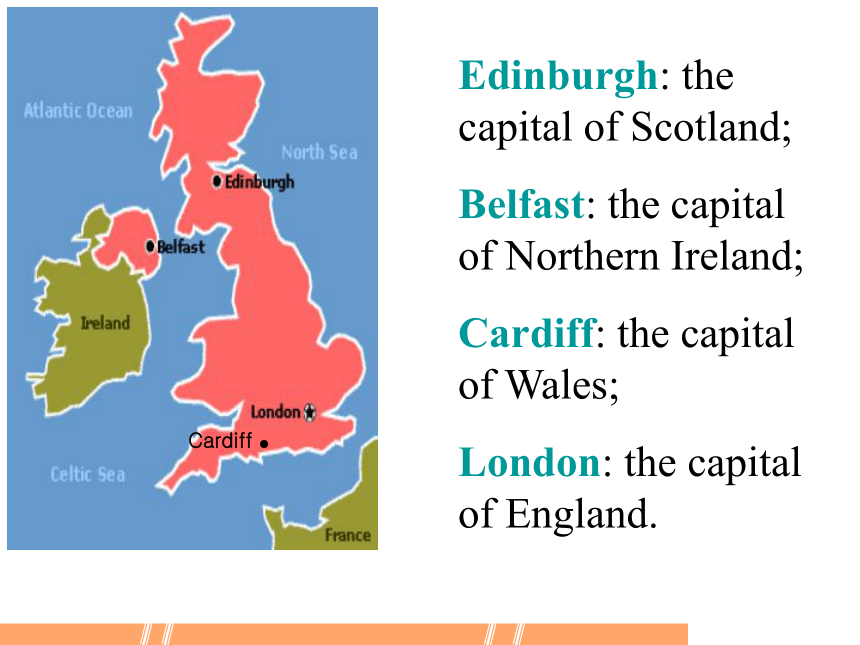
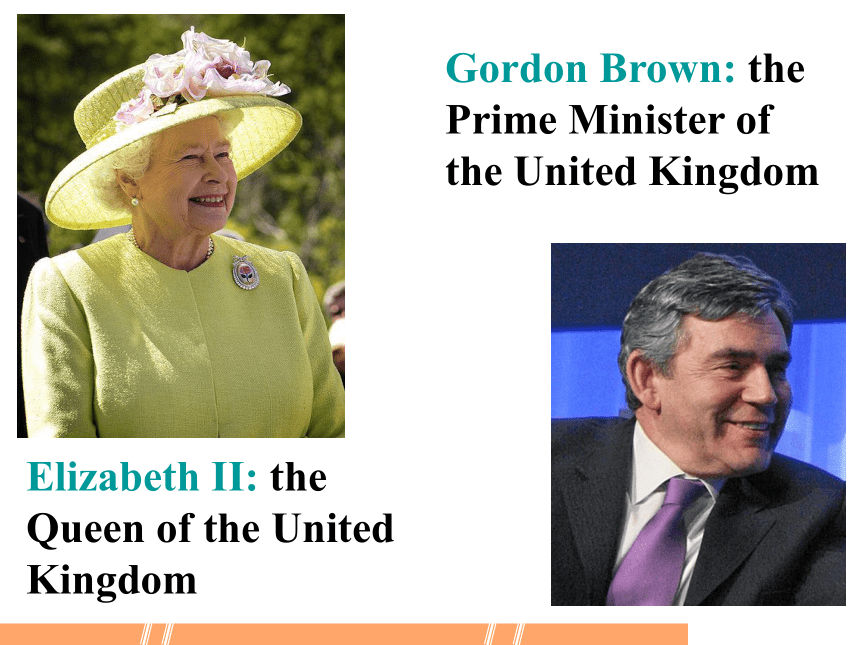
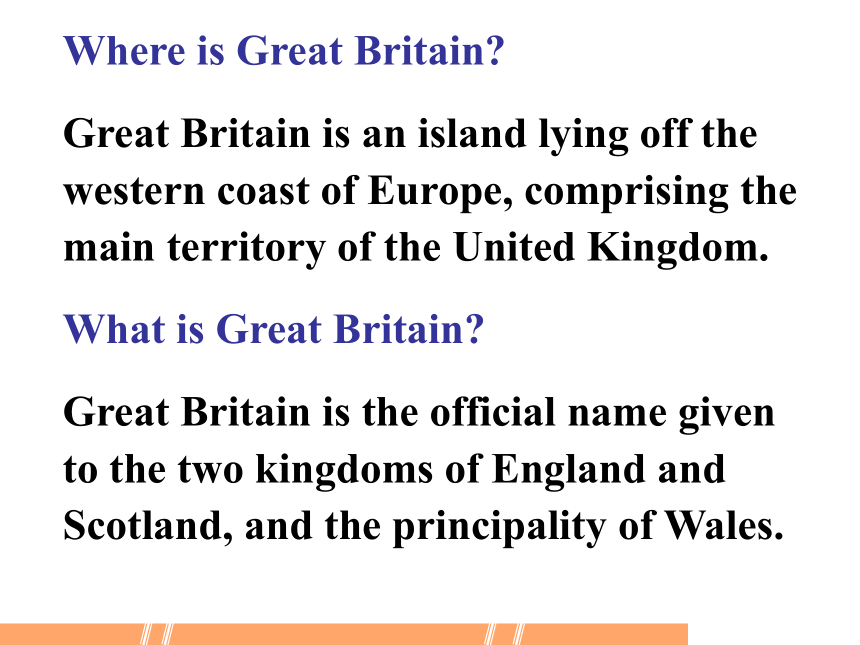
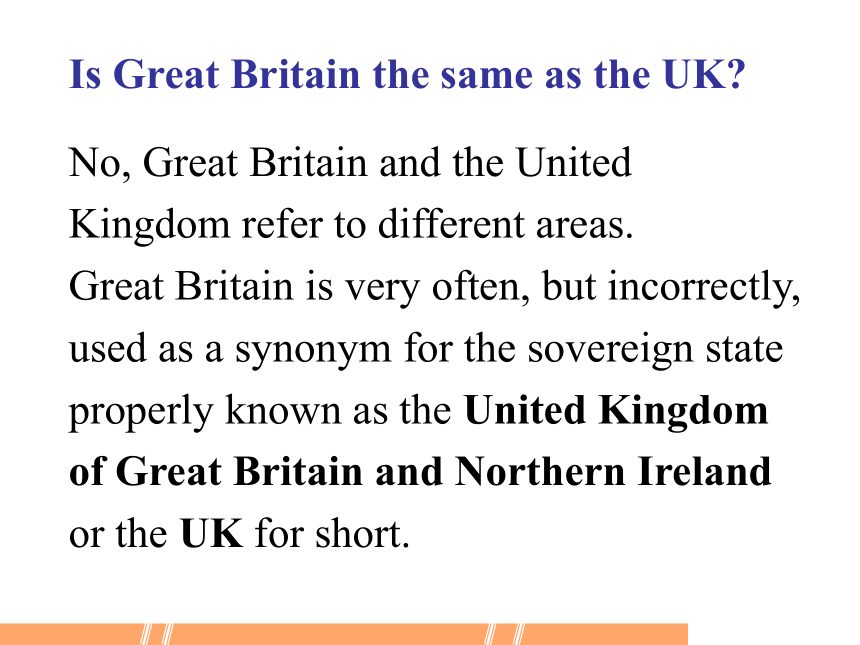
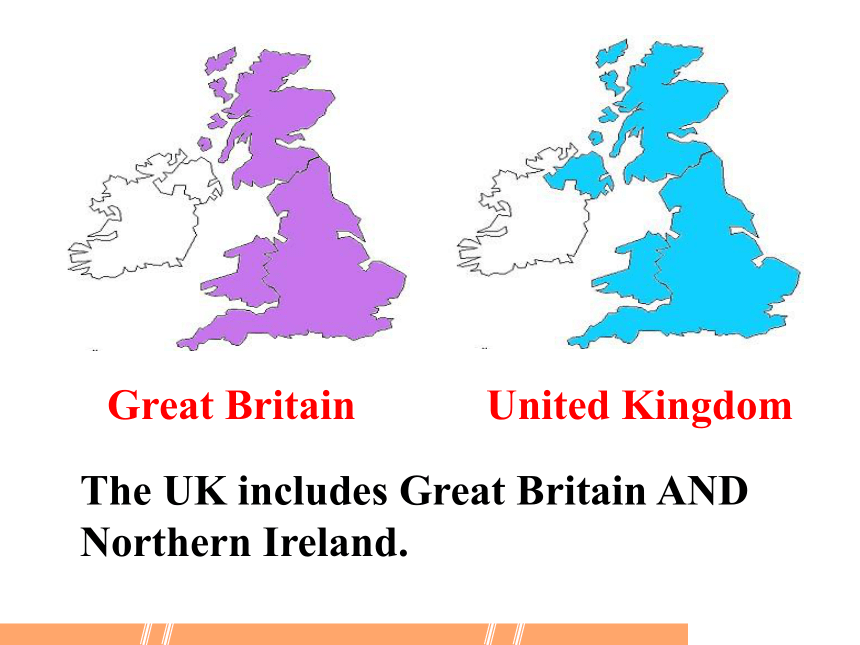
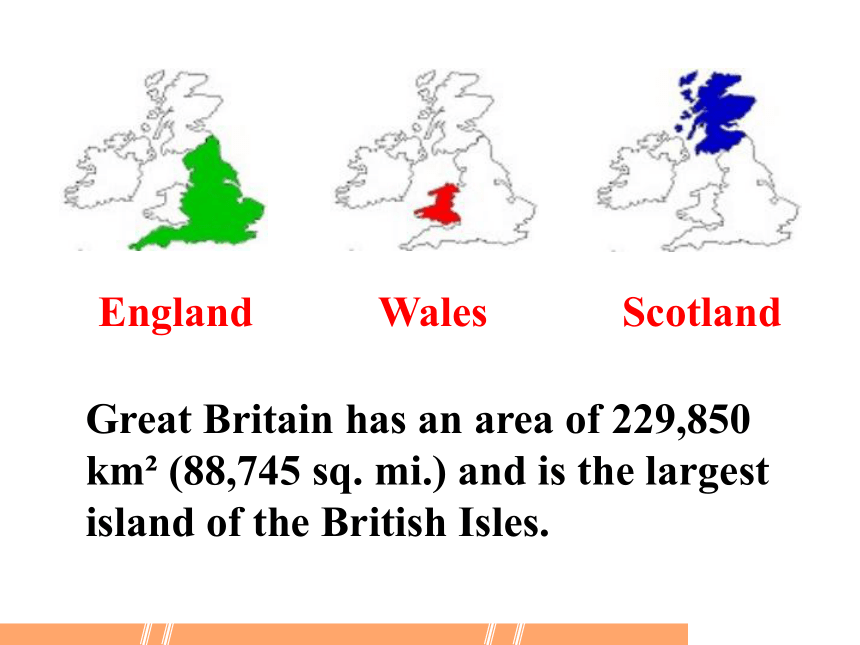
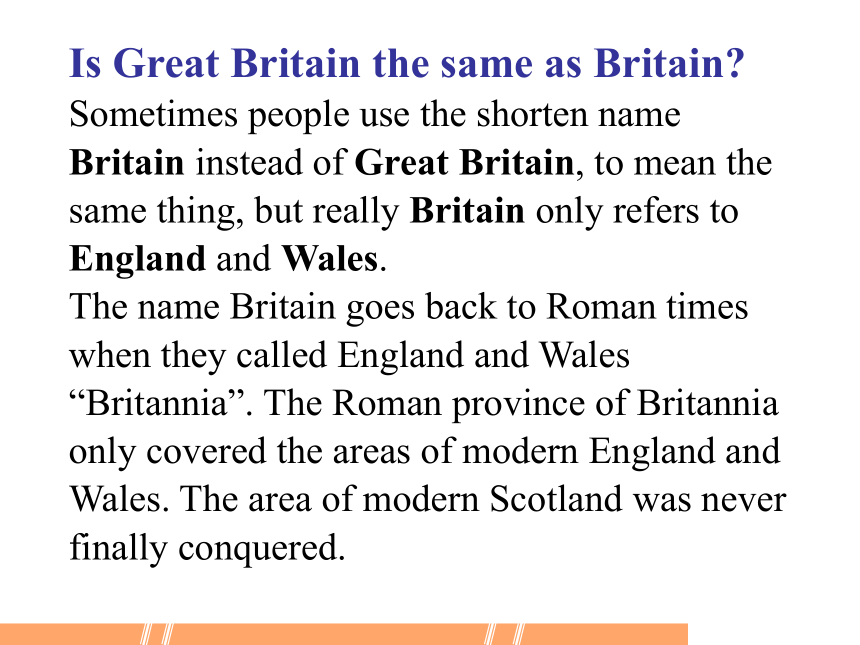
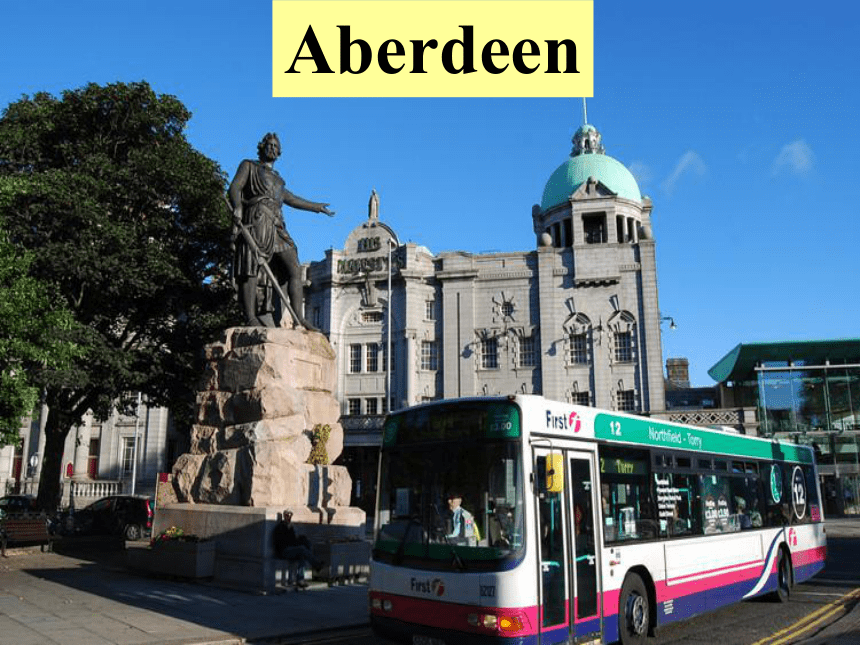
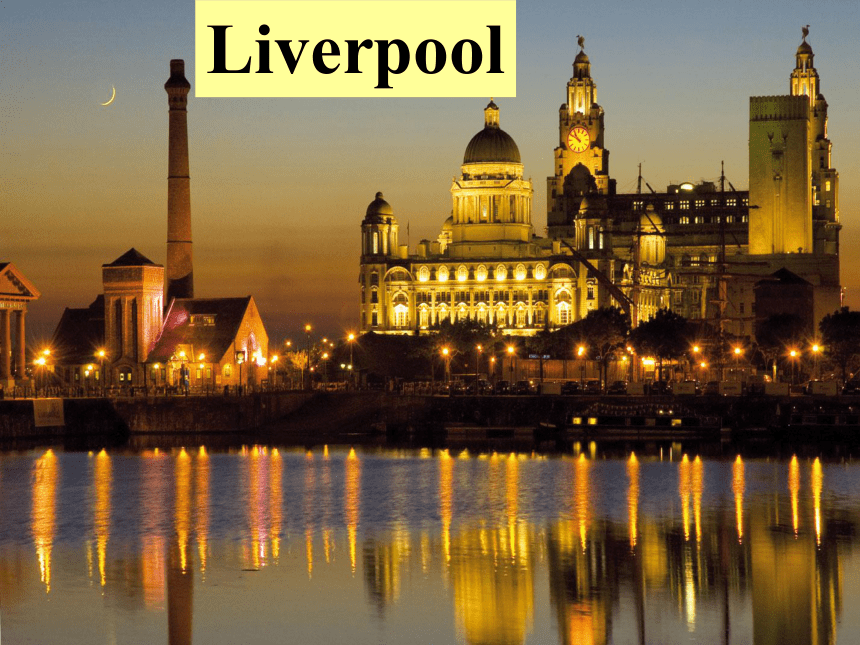
文档简介
课件55张PPT。Lesson 1
Visiting BritainUnit 12 Culture Shock1. What do you know about Britain and the British people?The United Kingdom of Great Britain and Northern Ireland consists ofEngland, Scotland ,Wales and Northern Ireland.ScotlandEnglandWalesNorthern IrelandMap of the UKWalesGreat Britain &northern Irelandthe UK
(Britain)ScotlandEnglandCardiff ●Edinburgh: the capital of Scotland;
Belfast: the capital of Northern Ireland;
Cardiff: the capital of Wales;
London: the capital of England.Elizabeth II: the Queen of the United Kingdom Gordon Brown: the Prime Minister of the United Kingdom Where is Great Britain?
Great Britain is an island lying off the western coast of Europe, comprising the main territory of the United Kingdom.
What is Great Britain?
Great Britain is the official name given to the two kingdoms of England and Scotland, and the principality of Wales. Is Great Britain the same as the UK?
No, Great Britain and the United Kingdom refer to different areas.
Great Britain is very often, but incorrectly, used as a synonym for the sovereign state properly known as the United Kingdom of Great Britain and Northern Ireland or the UK for short. Great BritainUnited KingdomThe UK includes Great Britain AND Northern Ireland. EnglandWalesScotlandGreat Britain has an area of 229,850 km2 (88,745 sq. mi.) and is the largest island of the British Isles. Is Great Britain the same as Britain?
Sometimes people use the shorten name Britain instead of Great Britain, to mean the same thing, but really Britain only refers to England and Wales.
The name Britain goes back to Roman times when they called England and Wales “Britannia”. The Roman province of Britannia only covered the areas of modern England and Wales. The area of modern Scotland was never finally conquered.AberdeenLiverpoolCambridgeCambridge UniversityOxford University of OxfordBirminghamManchesterEdinburghLondonBig BenHouses of Parliamentthe River ThamesTrafalgar SquareThe Tower BridgeSt Paul’s CathedralBuckingham PalaceThe British people are said to be reserved in manners, dress and speech. British PeopleThey are famous for their politeness, self-discipline and especially for their sense of humor. Basic politeness (please, thank you, excuse me) is expected. Greetings in BritainThe British are quite reserved when greeting one another. A greeting can be a bright ‘Hello’ ‘Hi’ or ‘Good morning’, when arriving at work or at school.
A handshake is the most common form of greeting among the British.
The usual formal greeting is a ‘How do you do?’ and a firm handshake, but with a lighter touch between men and women. British food has traditionally been based on beef, lamb, pork, chicken and fish and generally served with potatoes and one other vegetable. The most common and typical foods eaten in Britain include the sandwich, fish and chips, pies like the cornish pasty, trifle and roasts dinners.
The staple foods of Britain are meat, fish, potatoes, flour, butter and eggs. Many of their dishes are based on these foods.British FoodDOs in BritainDo stand in line.
Do take your hat off when you go indoors.
Do say “Excuse Me” “Please” “Thank you” and “Sorry”.
Do shake hands.
Do cover your mouth when yawning or coughing.
Do smile.
Do drive on the left side of the road.
Do open doors for other people. DON’TS in BritainDo not greet people with a kiss.
Do not talk loudly in public.
Do not stare at anyone in public.
Do not ask a lady her age.
Do not pick your nose in public.
Do not spit.
Do not burp in public.
Do not pass wind in public text.
Do not speak with your mouth full of food.
Do not ask personal or intimate questions. A quiz about the UK1. How many countries does the UK consist of? A. two B. three C. four
2. How long does it take to fly from Beijing to London Heal throw Airport?
A. About six hours
B. About ten hours
C. About sixteen hoursCB3. Who rules the country: the Prime Minister or the Queen? A. The Queen B. The Prime Minister C. both
4. What are the provinces called in England? A. counties B. departments C. provinces5. Which is the longest river in England? A. The River Avon B. The River Thames C. The River SevenBABWhat does the text mainly introduce?tipaccommodationVisit Britain1. Read the letter and decide if the sentences below are true (T) or false (F).1)You can only eat English food in London.
2) Aunt Mei is visiting for one week.
3) You don’t always need to leave a tip after a meal in a restaurant.FTT4) Some British mushrooms aren’t safe to eat.
5) British people never laugh.
6) There are many Chinese restaurants in Britain.
7) Most British are friendly.
8) It is always foggy in London.TFTTF2. Answer the following questions.Why does the writer think London an
international city?
Because there are people from all over
the world living in London and as a
result there are many international
restaurants.
2) What do British people eat for
breakfast?
Bacon and eggs with a few slices of
toast.3) What’s the writer’s suggestion to his aunt about tipping?
4) Why does the writer ask his aunt not to forget a warm coat?He suggests leaving 10% of the bill for the waiter or waitress if a tip is not included in the bill.Because it can get pretty cold and foggy in Britain. Aunt Mei is coming to London for the first time. In a letter from Xiaojin, who has been in London for 1. __________, she has been told what she can expect to find. Firstly, 2. ___________. People there normally have 3. _________ and eggs with a few slices of toast for 4. __________ even though there are many Chinese restaurants in Britain. 6 months the food bacon breakfast Secondly, 5. ___________. It is proper to leave 10% of the 6. ________ as a tip if it is not included in the bill. Thirdly, places to visit. It is well worth spending some nights in the English 7. ____________ where they may pick some 8.__________ for breakfast. Finally, British humour. British humour is hard to understand. The British find 9. _________________ funny, but the majority of them are really 10. _________.tipping bill countryside mushrooms the strangest things friendly 1. I don’t know what your expectations are of London, but knowing that you’ve never travelled outside of Asia, I thought I’d tell you a bit about what you can expect to find.
[参考译文]我不知道您对伦敦有什么期望,但是我知道您从来没有到亚洲以外的地方旅游过,所以我想告诉您一些您可能看到的情况。 (1) 这个句子由but 连接的两个并列句组成;
(2) 第一个并列句中由what引导的名词性从句作宾语;在本句中,of London的正常位置在are的前面,还原为:I don’t know what your expectations of London are,由于宾语从句的谓语动词are太短,故而将其提前,放在了of London的前面。[结构分析](3) 第二个并列句中含有一个现在分词
结构knowing that you’ve never travelled outside of Asia作原因状语,相当于原因状语从句since I know that you’ve never travelled outside of Asia。2. To avoid getting confused about the British tipping system, you need to check your bill to see if a tip is included or not.
[参考译文]为了避免为英国的小费体制感到困惑,您需要查看一下帐单,确认小费是否已包含在帐单中。[结构分析]
(1) 主句的主谓结构是 you need to check your bill;
(2) to see if ... 作check your bill 的目的状语,其中if a tip is included or not是名词性从句,作see的宾语;
(3) To avoid getting confused about the British tipping system 作全句的目的状语。3. I think we should consider staying in the English countryside for a few nights as I know you enjoy hiking.
[参考译文]
我知道您喜欢远足,所以我想我们应该在英国的乡村住几晚。
[结构分析]
(1) 主句的谓语动词think后面是一个宾语从句;
(2) as引导了一个原因状语从句。
由于他的粗心,他没有通过考试。
(2) 史密斯先生还欠我1000美元。
(3) 他认为自己是靠自己的能力成功的。
(4) 我们老板拥有五辆汽车。Owing to his carelessness, he failed in the exam. Mr. Smith still owes me 1,000 dollars. He owed his success to his own ability. Our boss owns five cars. 翻译句子:2. I’ve just been so busy studying and trying to absorb all the new things around me — I think I’m still experiencing culture shock.
[点拨]
absorb在此处作及物动词,表示“吸收/理解(知识等)”。又如:
Too much information was given out at the meeting; I couldn’t absorb it at once.
会议上给出的信息太多了,我没有办法一下子全部理解。absorb还可以表示“承受;经受”。如:
Last year, our company absorbed a £7m loss because of the failed plan.
因为那个失败的方案,我们公司去年承受了七百万英镑的损失。
absorb 还常与in连用,表示“使全神贯注”。如:
He was so absorbed in his task that he didn’t notice dusk approaching.
他全神贯注于自己的任务,以至于没有发现黄昏的来临。我们应该种植更多的树木来吸收污染。
We should plant more trees to absorb the
pollution.
(2) 理解了被告知的内容后,她变得很生气。
Having absorbed what is said to her, she
became very angry.
(3) 我进屋的时候,他正在全神贯注地看书。
When I entered the room, he was absorbed in
the book. 翻译句子:3. You’re going to have to get used to bacon and eggs with a few slices of toast for breakfast over here, Aunt Mei!
[点拨]
get used to表示“习惯于做某事/适应某物或某事”。此处的to是一个介词,其后要接名词或动名词。又如:
Don’t worry. You will soon get used to the climate here.
别担心,你很快就会适应这里的气候的。HomeworkDo exercises6 on page 37.
Finish off exercises 1-5 on pages 78-79.
Look at Exercise 4 and write a similar text for foreigners visiting your city.Thank you!
Visiting BritainUnit 12 Culture Shock1. What do you know about Britain and the British people?The United Kingdom of Great Britain and Northern Ireland consists ofEngland, Scotland ,Wales and Northern Ireland.ScotlandEnglandWalesNorthern IrelandMap of the UKWalesGreat Britain &northern Irelandthe UK
(Britain)ScotlandEnglandCardiff ●Edinburgh: the capital of Scotland;
Belfast: the capital of Northern Ireland;
Cardiff: the capital of Wales;
London: the capital of England.Elizabeth II: the Queen of the United Kingdom Gordon Brown: the Prime Minister of the United Kingdom Where is Great Britain?
Great Britain is an island lying off the western coast of Europe, comprising the main territory of the United Kingdom.
What is Great Britain?
Great Britain is the official name given to the two kingdoms of England and Scotland, and the principality of Wales. Is Great Britain the same as the UK?
No, Great Britain and the United Kingdom refer to different areas.
Great Britain is very often, but incorrectly, used as a synonym for the sovereign state properly known as the United Kingdom of Great Britain and Northern Ireland or the UK for short. Great BritainUnited KingdomThe UK includes Great Britain AND Northern Ireland. EnglandWalesScotlandGreat Britain has an area of 229,850 km2 (88,745 sq. mi.) and is the largest island of the British Isles. Is Great Britain the same as Britain?
Sometimes people use the shorten name Britain instead of Great Britain, to mean the same thing, but really Britain only refers to England and Wales.
The name Britain goes back to Roman times when they called England and Wales “Britannia”. The Roman province of Britannia only covered the areas of modern England and Wales. The area of modern Scotland was never finally conquered.AberdeenLiverpoolCambridgeCambridge UniversityOxford University of OxfordBirminghamManchesterEdinburghLondonBig BenHouses of Parliamentthe River ThamesTrafalgar SquareThe Tower BridgeSt Paul’s CathedralBuckingham PalaceThe British people are said to be reserved in manners, dress and speech. British PeopleThey are famous for their politeness, self-discipline and especially for their sense of humor. Basic politeness (please, thank you, excuse me) is expected. Greetings in BritainThe British are quite reserved when greeting one another. A greeting can be a bright ‘Hello’ ‘Hi’ or ‘Good morning’, when arriving at work or at school.
A handshake is the most common form of greeting among the British.
The usual formal greeting is a ‘How do you do?’ and a firm handshake, but with a lighter touch between men and women. British food has traditionally been based on beef, lamb, pork, chicken and fish and generally served with potatoes and one other vegetable. The most common and typical foods eaten in Britain include the sandwich, fish and chips, pies like the cornish pasty, trifle and roasts dinners.
The staple foods of Britain are meat, fish, potatoes, flour, butter and eggs. Many of their dishes are based on these foods.British FoodDOs in BritainDo stand in line.
Do take your hat off when you go indoors.
Do say “Excuse Me” “Please” “Thank you” and “Sorry”.
Do shake hands.
Do cover your mouth when yawning or coughing.
Do smile.
Do drive on the left side of the road.
Do open doors for other people. DON’TS in BritainDo not greet people with a kiss.
Do not talk loudly in public.
Do not stare at anyone in public.
Do not ask a lady her age.
Do not pick your nose in public.
Do not spit.
Do not burp in public.
Do not pass wind in public text.
Do not speak with your mouth full of food.
Do not ask personal or intimate questions. A quiz about the UK1. How many countries does the UK consist of? A. two B. three C. four
2. How long does it take to fly from Beijing to London Heal throw Airport?
A. About six hours
B. About ten hours
C. About sixteen hoursCB3. Who rules the country: the Prime Minister or the Queen? A. The Queen B. The Prime Minister C. both
4. What are the provinces called in England? A. counties B. departments C. provinces5. Which is the longest river in England? A. The River Avon B. The River Thames C. The River SevenBABWhat does the text mainly introduce?tipaccommodationVisit Britain1. Read the letter and decide if the sentences below are true (T) or false (F).1)You can only eat English food in London.
2) Aunt Mei is visiting for one week.
3) You don’t always need to leave a tip after a meal in a restaurant.FTT4) Some British mushrooms aren’t safe to eat.
5) British people never laugh.
6) There are many Chinese restaurants in Britain.
7) Most British are friendly.
8) It is always foggy in London.TFTTF2. Answer the following questions.Why does the writer think London an
international city?
Because there are people from all over
the world living in London and as a
result there are many international
restaurants.
2) What do British people eat for
breakfast?
Bacon and eggs with a few slices of
toast.3) What’s the writer’s suggestion to his aunt about tipping?
4) Why does the writer ask his aunt not to forget a warm coat?He suggests leaving 10% of the bill for the waiter or waitress if a tip is not included in the bill.Because it can get pretty cold and foggy in Britain. Aunt Mei is coming to London for the first time. In a letter from Xiaojin, who has been in London for 1. __________, she has been told what she can expect to find. Firstly, 2. ___________. People there normally have 3. _________ and eggs with a few slices of toast for 4. __________ even though there are many Chinese restaurants in Britain. 6 months the food bacon breakfast Secondly, 5. ___________. It is proper to leave 10% of the 6. ________ as a tip if it is not included in the bill. Thirdly, places to visit. It is well worth spending some nights in the English 7. ____________ where they may pick some 8.__________ for breakfast. Finally, British humour. British humour is hard to understand. The British find 9. _________________ funny, but the majority of them are really 10. _________.tipping bill countryside mushrooms the strangest things friendly 1. I don’t know what your expectations are of London, but knowing that you’ve never travelled outside of Asia, I thought I’d tell you a bit about what you can expect to find.
[参考译文]我不知道您对伦敦有什么期望,但是我知道您从来没有到亚洲以外的地方旅游过,所以我想告诉您一些您可能看到的情况。 (1) 这个句子由but 连接的两个并列句组成;
(2) 第一个并列句中由what引导的名词性从句作宾语;在本句中,of London的正常位置在are的前面,还原为:I don’t know what your expectations of London are,由于宾语从句的谓语动词are太短,故而将其提前,放在了of London的前面。[结构分析](3) 第二个并列句中含有一个现在分词
结构knowing that you’ve never travelled outside of Asia作原因状语,相当于原因状语从句since I know that you’ve never travelled outside of Asia。2. To avoid getting confused about the British tipping system, you need to check your bill to see if a tip is included or not.
[参考译文]为了避免为英国的小费体制感到困惑,您需要查看一下帐单,确认小费是否已包含在帐单中。[结构分析]
(1) 主句的主谓结构是 you need to check your bill;
(2) to see if ... 作check your bill 的目的状语,其中if a tip is included or not是名词性从句,作see的宾语;
(3) To avoid getting confused about the British tipping system 作全句的目的状语。3. I think we should consider staying in the English countryside for a few nights as I know you enjoy hiking.
[参考译文]
我知道您喜欢远足,所以我想我们应该在英国的乡村住几晚。
[结构分析]
(1) 主句的谓语动词think后面是一个宾语从句;
(2) as引导了一个原因状语从句。
由于他的粗心,他没有通过考试。
(2) 史密斯先生还欠我1000美元。
(3) 他认为自己是靠自己的能力成功的。
(4) 我们老板拥有五辆汽车。Owing to his carelessness, he failed in the exam. Mr. Smith still owes me 1,000 dollars. He owed his success to his own ability. Our boss owns five cars. 翻译句子:2. I’ve just been so busy studying and trying to absorb all the new things around me — I think I’m still experiencing culture shock.
[点拨]
absorb在此处作及物动词,表示“吸收/理解(知识等)”。又如:
Too much information was given out at the meeting; I couldn’t absorb it at once.
会议上给出的信息太多了,我没有办法一下子全部理解。absorb还可以表示“承受;经受”。如:
Last year, our company absorbed a £7m loss because of the failed plan.
因为那个失败的方案,我们公司去年承受了七百万英镑的损失。
absorb 还常与in连用,表示“使全神贯注”。如:
He was so absorbed in his task that he didn’t notice dusk approaching.
他全神贯注于自己的任务,以至于没有发现黄昏的来临。我们应该种植更多的树木来吸收污染。
We should plant more trees to absorb the
pollution.
(2) 理解了被告知的内容后,她变得很生气。
Having absorbed what is said to her, she
became very angry.
(3) 我进屋的时候,他正在全神贯注地看书。
When I entered the room, he was absorbed in
the book. 翻译句子:3. You’re going to have to get used to bacon and eggs with a few slices of toast for breakfast over here, Aunt Mei!
[点拨]
get used to表示“习惯于做某事/适应某物或某事”。此处的to是一个介词,其后要接名词或动名词。又如:
Don’t worry. You will soon get used to the climate here.
别担心,你很快就会适应这里的气候的。HomeworkDo exercises6 on page 37.
Finish off exercises 1-5 on pages 78-79.
Look at Exercise 4 and write a similar text for foreigners visiting your city.Thank you!
